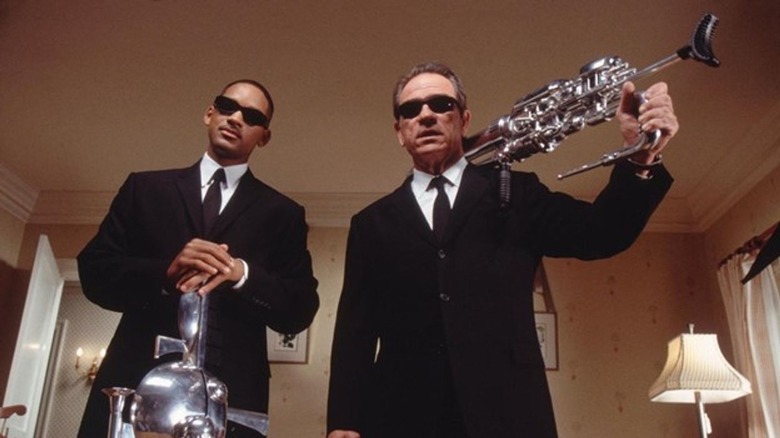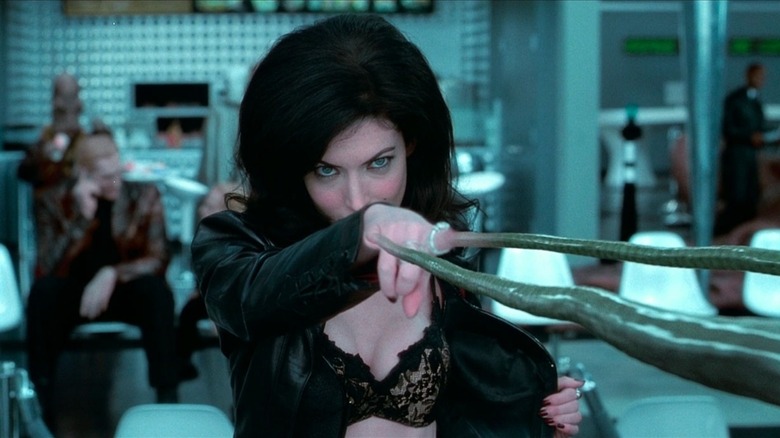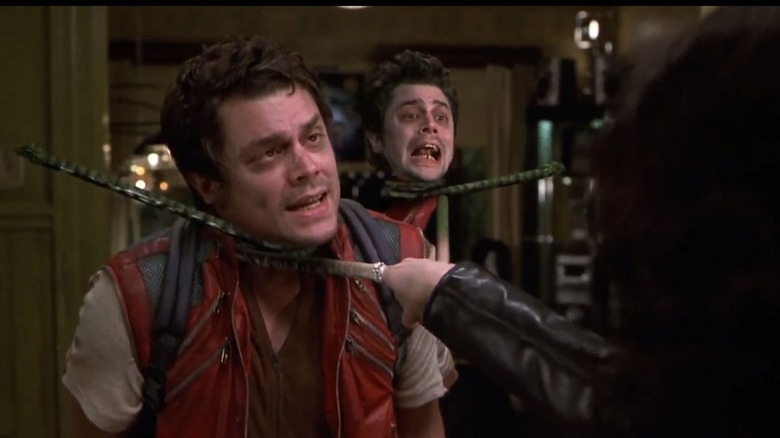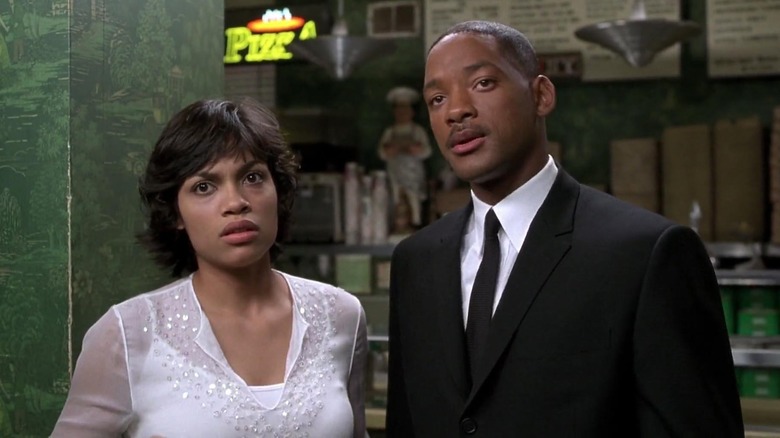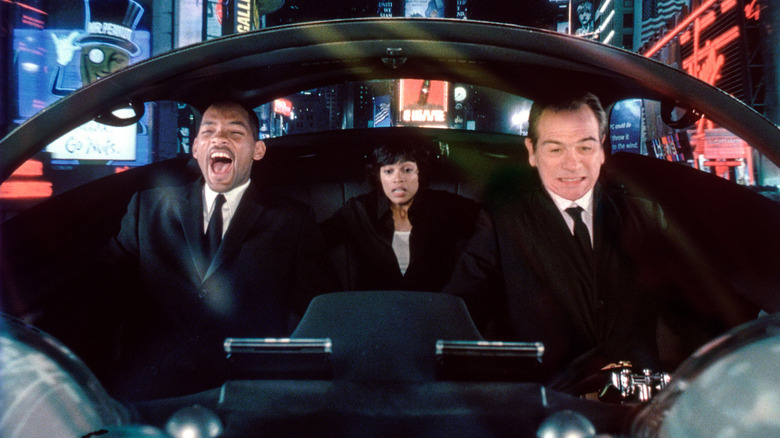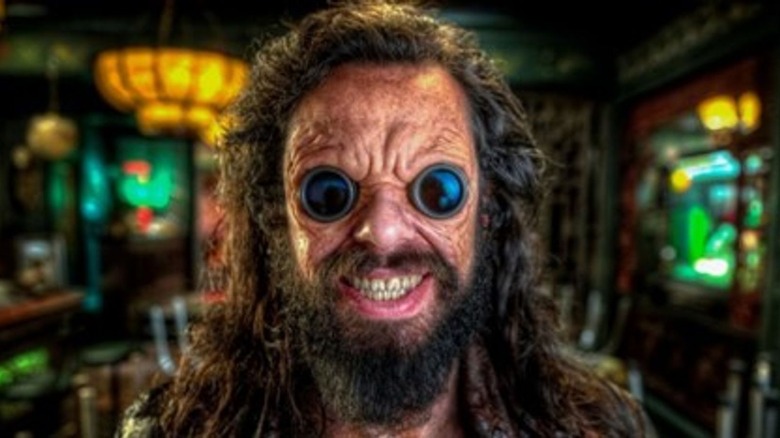Barry Sonnenfeld Has Some Regrets About The Making Of Men In Black II
In the science fiction action-comedy "Men in Black II," Agent J (Will Smith) lures his former mentor from the original, Agent K (Tommy Lee Jones), out of retirement five years after the events of the previous film to help track down the mysterious Light of Zartha before it's captured by Serleena, an evil alien from the planet Kyloth. The 2002 sequel was yet another one of Will Smith's summer blockbuster hits, breaking box office records previously held by Smith-starred movies "Independence Day" and the first "Men in Black."
The film, however, didn't achieve the same critical acclaim as the 1997 original. The director of the first three "MIB" films, Barry Sonnenfeld, seemingly agrees that the second installment could have been a better film. Piggybacking off the time-travel storyline in "MIB 3," in a 2012 interview with MTV, the director was asked if he could travel back in time, would he do anything differently for "Men in Black II." The director answered, "Yeah, for sure," and named three distinct things.
Create a better villain
"MIB II" director Barry Sonnenfeld first told MTV he would make sure the film had a better villain. I find this a little surprising because I see Serleena, the film's main antagonist, as a carbon copy of the original's villain, who worked out just fine. In the first film, the Bug, a giant alien insect, lands on earth and disguises itself in the body of a wife-abusing farmer and spends much of the film searching to steal the Arquilian Galaxy. In "MIB II," the villain is another alien who drops down to earth and disguises itself, this time as a seductive Victoria's Secret model. Again, the villain spends much of the film searching for something important; in this case, it's the Light of Zartha.
However, while both villains don't have a problem taking out anyone who gets in their way, the Bug is more of a loose cannon. Taking out an innocent exterminator by shoving his own pest control sprayer in his mouth and leaving a short-order cook folded up like a pretzel is absolutely unhinged. That said, the Bug isn't necessarily revered as one of the best sci-fi movie villains of all time, so it's not like the villain left big shoes for its successor to fill.
Sure, Sonnenfeld could have beefed up some of Serleena's personality traits (the Bug is one grouchy son of a gun who gets ticked off if you squish a cockroach). But as a villain who disrupts the status quo and makes life difficult for the protagonists, Serleena is pretty much on par with the Bug. Perhaps Sonnenfeld wished a different actor were cast to play the villain. Lara Flynn Boyle picked up criticism and a Razzie nomination for Worst Supporting Actress for her performance in the film.
Character development over comedy
The second change Barry Sonnenfeld said he would make is realizing the core strength of the series was more about character development rather than comedy. Action mixed with a healthy dose of comedy usually makes for a good summer blockbuster. I definitely appreciated "MIB II” for its laughs, particularly the beatbox battle between Agent J and the post office worker, who happens to be the late, great human beatbox and "Just a Friend" rapper Biz Markie, so it was cool to see two wholesome rappers from the '80s face off in a hilarious battle in a 2000s sci-fi movie. Then there's the Michael Jackson cameos, where the "King of Pop” petitions himself to become a Men in Black agent. I do, however, agree that the film over-relies on its comedy. One barrier that hinders Serleena from being a stronger villain is she's flanked by her dimwitted, double-headed accomplices Scrad and Charlie, who merely serve as additional comic relief.
Regarding character development, the concept of someone choosing to erase their entire existence, abandoning loved ones and a possible future leaves a lot to be explored. But I give "MIB II" credit in this department, as it did more heavy lifting than the original. In the first "MIB," I never fully understood why Agent J accepted the call to adventure knowing his existence would be wiped away forever. Why would he abandon his family? Was he an unloved orphan? Did his entire family get wiped out in a plane crash? We got some answers to these questions in the third installment, but the first leaves more to be desired.
MIB II's character development wasn't bad though
We do see some character development work in "MIB II" as Agent J begins to have regrets about his decision to join the secret organization at the expense of maintaining human connections. He somberly tells his new and soon-to-be ex-partner that "James Edwards (Agent J's birth name) just saved about 85 people on the subway tonight. No one knows he exists. And if no one knows he exists, how can anyone ever love him?" His conflict is further explored through his relationship with murder witness Laura Vasquez (Rosario Dawson), whom he chooses not to neuralyze after developing an attraction to her.
Furthermore, in the first film, the young hotshot rookie Agent J yearns for possession of the memory-erasing neuralyzer so he can do the "flashy thing." We see him finally get to use it at the end of the movie when he neuralyzes Agent K into retirement. Fast-forward to the beginning of "MIB II," and we learn Agent J is now neuralyzer-happy, finding any excuse to erase his partners' memories and exile them from the organization, a further illustration that he misses Agent K, the one human connection he developed since he joined the organization. But I agree that the film's emphasis on comedy overshadows these character development efforts.
More time to produce a more emotional script
The third thing Barry Sonnenfeld said he would do differently for "Men in Black II" is he wouldn't rush into production and take more time to hone the script so the film could be more emotional. This aligned with his desire to focus more on character development over comedy. But apparently, behind-the-scenes drama prevented him from doing so.
According to TV Guide, because Columbia Pictures was committed to a Fourth of July release date, everyone involved in the project felt immense pressure to produce a movie that would be just as successful at the box office as its predecessor, though with little preparation. Sonnenfeld told TV Guide in 2002:
"It was a very difficult movie for me to make. It was filled with stress, and a lot of the stress came from the fact that because the first movie was successful financially, everyone involved [in 'MIB II'] — the studio, the producers ... — were so unbelievably afraid that this one had to do well that they had to be very involved ... So, it was really tough."
The stress was so severe that it actually landed Sonnenfeld in the hospital. He recalled one particular bad night on set when he had to retreat to his trailer to meditate. "... My arm went totally asleep, all of my fingers went cold and I couldn't feel anything under my armpit," he recalled. "Then, my chest [felt] like someone was blowing a balloon up in it."
Sonnenfeld said the fear, tension and anxiety he developed from working on the film compromised his health. "I'll never be okay as long as I live," he said. "I've still got sciatica." Yikes! I'm surprised Sonnenfeld returned to direct "MIB 3."
Redemption in MIB 3?
Ironically, one of the few apparent good things to come out of shooting "MIB II" is the concept for "MIB 3," which Will Smith proposed to Barry Sonnenfeld while onset. Sonnenfeld told Vulture in 2012:
"We were on the set of [MIB II] ... and [Will Smith] came up to me one night and said, 'Baz' — he calls me Baz — 'Baz, I have an idea for the next one.' And then he said something would happen to Tommy Lee Jones because of an alien, and he'd have to go back in the past to save Agent K, and in doing this, he and the audience would learn secrets and answers to questions that we never knew we needed to ask."
For reasons already mentioned, at the time Sonnenfeld was not in the space to consider the pitch, let alone a third film. "Can we just finish this one first?" he told Smith. Years later, when "MIB 3" was greenlit, Sony decided to go with Smith's idea.
The third installment allowed Sonnenfeld to address the perceived weaknesses of the sequel. The film's villain, Boris the Animal (Jemaine Clement), is badder, meaner and more unstoppable than the Bug and Serleena combined, taking the form of a supervillain straight from the pages of a comic book. Boris the Animal even kills agent K, just as Will Smith proposed a decade earlier. And the third film concentrates more on character development, providing answers to the lingering questions regarding Agent J's upbringing and family, which in turn makes for a more emotional film.
